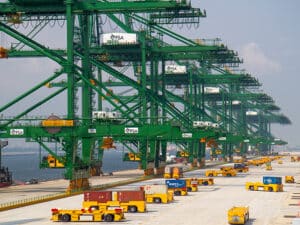
Op-Ed: Secure communications in troubled waters
Written by
Don Sortor says containerships are under attack daily, with terrorist groups and pirates aiming to disrupt shipping channels and routes.
By Don Sortor
Maritime shipping is an integral part of and crucial to the world economy. This is true particularly in The Middle East with some of the world’s busiest waterways like the Suez Canal and the Bab al-Mandab Strait. The region has been rife with challenges that are disrupting shipping routes and impacting global trade.
- Houthi attacks: The ongoing conflict in Yemen between the Saudi-led coalition and the Iran-backed Houthi rebels has seen an increase in indiscriminate attacks on commercial shipping and military vessels in the Red Sea and the Gulf of Aden ostensibly to protest the conflict in Gaza. These attacks, involving drones and missiles, have disrupted the flow of trade and raised concerns about the security of the region’s waterways.
- Suez Canal disruptions: The Suez Canal is a vital shipping lane that connects the Mediterranean Sea to the Red Sea, and any disruptions here can have a major impact on global trade. In 2021, the Ever Given container ship became wedged in the canal for six days, causing billions of dollars in losses and highlighting the vulnerability of this critical chokepoint.
- Piracy in the Gulf of Aden: While piracy has declined in recent years, it remains a threat in the Gulf of Aden, off the coast of Somalia. Incidents of piracy are ongoing from The Middle East to Africa to the Indian sub-continent to Southeast Asia, highlighting the need for continued vigilance and international cooperation to combat this issue.
Geopolitical instability and armed conflicts have stymied maritime shipping. Containerships are under attack daily, with terrorist groups and pirates aiming to disrupt shipping channels and routes. And they are succeeding. Operators are being forced to suspend service or navigate longer routes, incurring longer delivery times and added costs.
Communicating in conflict zones can be challenging. Shipping companies use satellite services such as Starlink for voice and data transmissions. However, these services, like the Internet and mobile carriers, are vulnerable to eavesdropping and manipulation. Thus, communications from ship to shore are unprotected and can be monitored and/or intercepted, making these large shipping vessels vulnerable to attack – via land, sea, or air.
Operating in conflict zones requires contingency planning and emergency procedures, and communications are critical. Maritime operators are facing a grim reality that the areas and waters they operate in are high-risk. Ensuring security of personnel in any environment is paramount, but even more so in conflict zones.
A critical component of physical security is safeguarding the vessel and the crew’s digital footprint with respect to mobile connectivity, apps, and other connected services. Secure messaging apps like QTel provide an overlay technology that safeguards voice, text and video conversations across terrestrial and satellite networks. For communications to remain private and secure it is critical to utilize ultra-secure peer-to-peer encryption, among other advanced security features. Applications that operate within a private network environment ensure authorized users can interact securely.
Secure messaging apps suitable for maritime use cases must support satellite networks such as Starlink, as well as microwave and broadband RF. Communicating within conflict zones from ship to shore requires new tools that protection communications from being intercepted or manipulated.
About the author
With over 30 years of experience in the security industry, Don Sortor is a seasoned executive who is passionate about protecting data, voice, and video communications. As the Senior VP at Global Integrity, he oversees sales, marketing, and business development, enabling government, non-profits, and enterprise organizations to safeguard their communications.
Sortor is a U.S. Navy veteran and a Chairman of the ASIS Sensitive Information Protection Community Steering Committee with a core mission is to enable and empower people to communicate securely and confidently.




